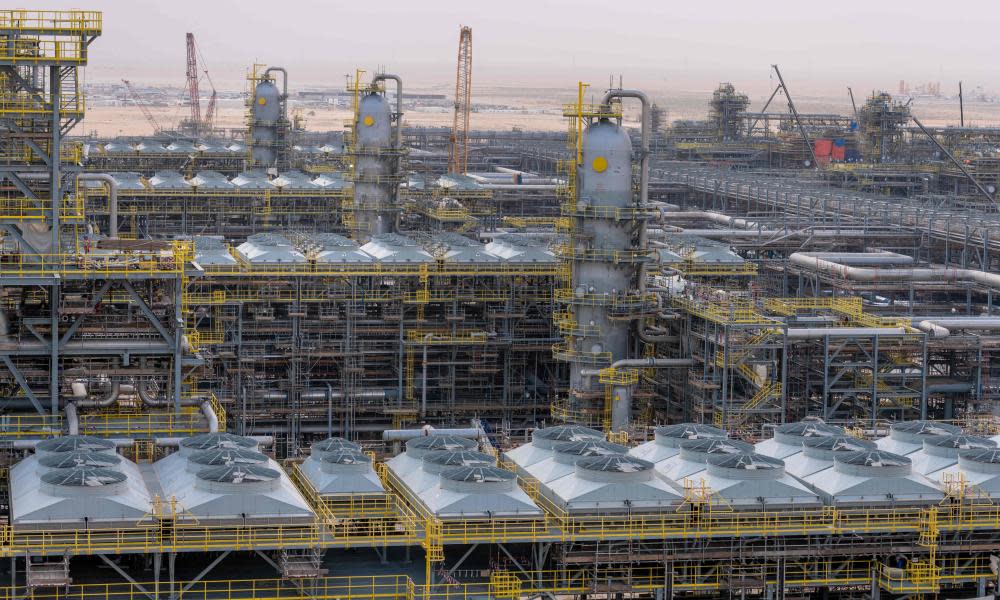Oil companies blame clean energy transition for market volatility

Representatives at industry gathering in Houston launch attack on the speed of transition to clean energy
Leaders of the world’s biggest oil companies have used an industry gathering in Houston to launch an attack on the speed of transition to clean energy, claiming a badly managed process could lead to “insecurity, rampant inflation and social unrest”.
Executives from oil companies including Saudi Aramco, the world’s biggest oil producer, and US oil giants ExxonMobil and Chevron publicly described the shift towards clean energy alternatives as “deeply flawed”. They called for fossil fuels to remain part of the energy mix for years to come despite global efforts for an urgent response to the climate crisis.
Saudi Aramco’s chief executive, Amin Nasser, told delegates at the World Petroleum Congress in Houston, Texas, that adapting to cleaner fuels “overnight” could trigger uncontrolled economic inflation.
“I understand that publicly admitting that oil and gas will play an essential and significant role during the transition and beyond will be hard for some,” he said. “But admitting this reality will be far easier than dealing with energy insecurity, rampant inflation and social unrest as the prices become intolerably high, and seeing net zero commitments by countries start to unravel.
“The world is facing an ever more chaotic energy transition centred on highly unrealistic scenarios and assumptions about the future of energy.”
Anders Opedal, the boss of Equinor, Norway’s state oil company, said: “The volatility in commodity prices and the impact on business and people illustrates the risks we face in an imbalanced transition.”
Global oil and gas prices have surged in recent months since the original Covid-19 lockdown, which stifled economies around the world in 2020. Energy experts and economists have argued that the global energy market surge – which has triggered blackouts, higher bills and the shutdown of factories in some countries – should encourage policymakers to accelerate the move away from volatile fossil fuels.
Amin said that many “assume that the right transition strategy is in place”. He said: “It’s not. Energy security, economic development and affordability are clearly not receiving enough attention.”
Saudi Arabia’s state-owned oil company has made the biggest contribution to the carbon dioxide emissions responsible for the global climate crisis of any major company, according to an investigation by the Guardian, after producing almost 60m tonnes of CO2 emissions between the 1960s and 2017.
Related: Revealed: the 20 firms behind a third of all carbon emissions
Chevron has made the second largest corporate contribution to global heating after producing 43.35bn tonnes of CO2 emissions over the same period. The company’s chief executive, Mike Wirth, told the same industry conference that oil and gas “continue to play a central role in meeting the world’s energy needs, and we play an essential role in delivering them in a lower carbon way. Our products make the world run.”
Darren Woods, the chief executive of ExxonMobil, the fourth largest corporate climate polluter behind Russia’s state-backed gas company Gazprom, told the conference: “The fact remains, under most credible scenarios, including net zero pathways, oil and natural gas will continue to play a significant role in meeting society’s need.”
The calls for a slower transition to clean energy put oil executives on a collision course with those energy industry experts, climate scientists and governments which have warned that without a rapid phasing out of CO2 emissions within the next decade catastrophic levels of global heating will be unavoidable.
The US deputy energy secretary, David Turk, speaking at the same conference, rebuffed the industry’s stance against a rapid shift to cleaner energy by insisting that action to address the climate crisis was urgent. “There is not an alternative to stepping up and fixing the threat to climate change,” he said.
The global energy watchdog, the International Energy Agency, told the industry last year that no new fossil fuel projects were compatible with plans to prevent a climate crisis before 2050.
A spokesperson for Greenpeace UK said: “The fossil fuel markets have been a rollercoaster of volatility ever since they were invented and it’s ludicrous for big oil bosses to blame renewables for their instability. If anything, the recent surge in gas prices and the hardship it caused to so many households are yet more proof that the sooner we wean our societies off fossil fuels the better.”

 Yahoo Movies
Yahoo Movies 
